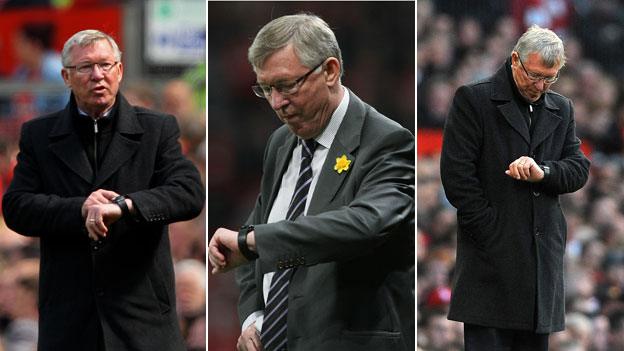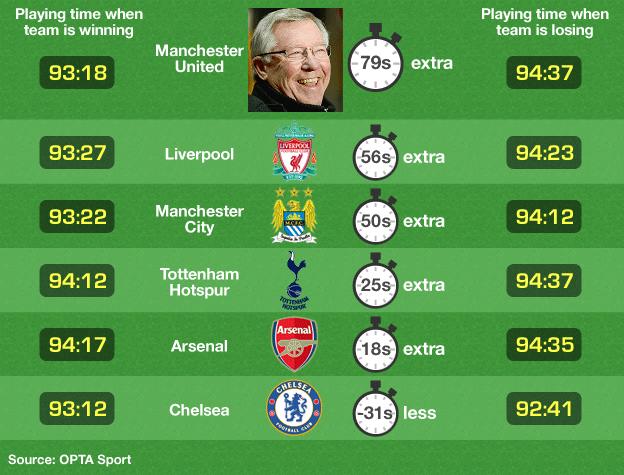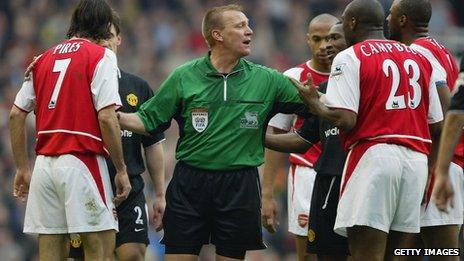Fergie time: Does it really exist?
- Published

It's a well-established idea among football fans that there's something called "Fergie time" - an extra helping of added time when Sir Alex Ferguson's team, Manchester United, are losing. But does it really exist?
The final minutes of a football game can be the tensest. If the match is tied, and both teams are desperate for victory, or one side is a goal down with the chance of pulling off a draw, these are desperate times.
Some (mostly non-Man Utd fans, it is fair to assume) accuse Sir Alex Ferguson's team of getting more added time to score that crucial final goal than any other team - and have dubbed this Fergie time.
If it does exist, it follows that referees aren't doing their job properly, as it's their responsibility to calculate how much time to add on at the end of the standard 90 minutes.
It is widely believed that referees add 30 seconds for each goal and substitution, and a certain amount for other stoppages such as injuries.

In fact, Fifa - world football's governing body - has no defined rules on the amount of time that should be added. Referees are supposed to work it out for themselves.
The 'Fergie time' files
Premier League added time, 2010/11 to present (Opta Sports)[25kb]
Former Premier League referee Graham Poll says that when you're refereeing, you don't believe in Fergie time.
"You dispel it as popular myth of teams that are jealous of Manchester United's success."
But when you take a step back, he says, you realise there could be something in it.
"I think it would be too easy to just say it's rubbish. When you analyse and think psychologically what happens, the pressure that's on you at Old Trafford or the Emirates or Stamford Bridge, the pressure that is implied upon you must have an effect, even if subconsciously."
(For the uninitiated, Old Trafford is Man Utd's ground, the Emirates stadium is Arsenal's and Stamford Bridge is the home of Chelsea.)
The phenomenon of Fergie time goes back to a game in the very first Premier League season, 1992/3, says Duncan Alexander of Opta Sports, which collates data from the football leagues.
It was Man Utd v Sheffield Wednesday, external and the score was 1-1 after 90 minutes. Seven minutes of added time were given, during which Steve Bruce scored for Man Utd, clearing the way for their first top-flight title in 26 years.
"Ever since then, every time United have been given quite a bit of injury time, it's been flagged up in people's heads and they've said, 'Oh United have got more Fergie time again'," says Alexander.
To work out whether there could be anything in it, he looked at the average amount of added time for the second half of every match. After all, the second half is where added time is going to matter most.
"This season United have had the most," he says.
So the suspicions about Fergie time are true - but only for this season.
Last season Man Utd had the lowest second-half average added time.
"Over the course of the 20-year Premier League there is not much consistency. United are not top every season," says Alexander.
But the crucial figure is how much added time Man Utd get when they have been drawing or losing after 90 minutes. Opta looked at the relevant data over the past three seasons - 2010-11, 2011-12, and the current season to date. They compared Man Utd with five other top teams:
Manchester City
Chelsea
Arsenal
Tottenham Hotspur
Liverpool
When Man Utd were losing, they had an average of four minutes and 37 seconds added time, Alexander says, compared with three minutes and 18 seconds when they were winning.
"So you can see there that in games they lost, they got more time," he says.
"For the other, so-called top teams, other than Chelsea, all of them had longer games on average when they were losing. Whether that's a case of the defending team wasting time to try and hang on to what would be a fairly notable victory, or whether it's because referees are influenced by the fact Man Utd are losing, this data doesn't show."
But Gabriella Lebrecht of Decision Technology - another firm that analyses sports statistics - has looked closely at the reasons why time has been added in matches over the last three complete seasons.
After the time added for events such as substitutions, yellow or red cards or goals, "you're left over with a certain amount which seems to be affected by the referee", she says
Her calculations show that if the home team is winning, then the added time is cut by 46 seconds.
"If a strong team is losing at home, they get more time than if a strong team is losing away," she says.

Referee Graham Poll (seen here in 2004) admits pressure can affect decisions
Lebrecht calculates whether a team is "strong", external based on their attacking and defensive performances. In the current season, Man City rate strongest, closely followed by Man Utd, Arsenal, Chelsea and Everton.
So Fergie time does appear to exist, especially if one of these strong teams is playing at home. This applies to Chelsea too.
"If they're playing away it doesn't seem to exist as much," says Lebrecht. "There is this idea in football statistics of a home advantage. No-one knows quite what causes it. We know it's statistically significant but we're unclear why. This could be a part of that home advantage."
One thing she has noted is that when a substitution is made in stoppage time "a lot more" time is added to the clock than would be added in normal time.
"The referee feels the [home side] fans' anger if he doesn't add on enough time," she says.
Graham Poll says this bears out from his experience.
"There is a pressure that's felt, that's tangible - you can feel as a referee out on the pitch - for that team to come back."
"You're sitting there going, 'OK, there's a couple of subs, goals, that's wasted time, injury there - we've got... three minutes maybe four.' Then you find yourself saying, 'Five'.
"That's something which then, sitting down and analysing it, you go, 'Where did that extra minute come from?' That's when that subconscious can kick in. It's a very strong referee that can actually recognise that and make sure he doesn't fall for it."
There is no statistical proof that Fergie time applies specifically to Man Utd. But the statistics do show a bias towards big teams.
Perhaps we should call it "Mancini time" or "Wenger time"? Or even "Benitez time" (or insert name of whoever is managing Chelsea at time of reading)?
You can follow the Magazine on Twitter, external and on Facebook, external
Listen to More or Less on BBC Radio 4 and the World Service, or download the free podcast.
- Published19 June 2012